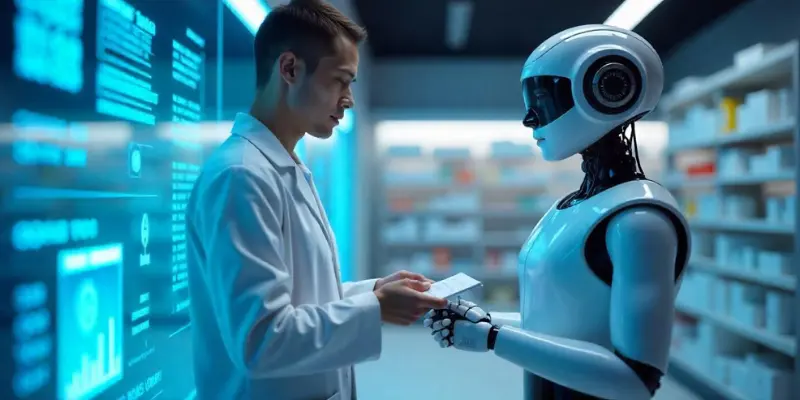Will AI Replace Pharmacists? Judging The Future of Pharmacists
Published: 16 Jun 2025
Can a robot really replace your local pharmacist? It sounds like a big question. But with AI growing fast in healthcare, many people are asking it.
Artificial intelligence, means machines that can think, learn and make decisions. In some hospitals and pharmacies, AI is already doing smart tasks like checking if two drugs will clash or helping count pills. That sounds helpful, right?
But does this mean pharmacists will lose their jobs? Not so fast.
In this article, we’ll look at what pharmacists really do, how AI is changing their work, and if it can ever take over completely. By the end, you’ll know if your next prescription will be handled by a machine or a person who cares.

Who is a Pharmacist?
A pharmacist is a healthcare professional, trained in medication science. He dispense medicines, educate patients on proper use, and ensure safety by checking drug interactions and side effects.
You can relate a pharmacist with a highly skilled chef in a busy kitchen. Doctors provide the recipe (prescriptions), and pharmacists ensure the right ingredients (medications) are used in the correct amounts. They check for any harmful mix-ups, just like a chef ensures flavors blend well without causing problems.
The Role of Pharmacists in Healthcare
Pharmacists do much more than just fill prescriptions. They are an important part of healthcare that make sure patients get the right medicines and understand how to use them safely. But what exactly do pharmacists do every day? Here is an overview;
1. Checking Prescriptions for Safety
Before handing over any medication, pharmacists double-check prescriptions. They make sure there are no dangerous drug interactions or incorrect dosages. This step prevents harmful mistakes and keeps patients safe.
2. Educating Patients About Medications
Have you ever had questions about the best time to take your medicine or side effects that many medicines could have in your body if not properly used? Pharmacists provide this guidance. This helps people understand their prescriptions and ensure they take medications correctly for the best results.
3. Managing Chronic Conditions
Pharmacists play a big role in helping patients with long-term illnesses like diabetes or high blood pressure. They offer advice on medication adjustments, lifestyle changes, and regular health check-ups.
4. Providing Personalized Healthcare Advice
Unlike AI, pharmacists offer human connection. They listen to concerns, provide reassurance and guide patients through their health journey. This personal touch builds trust and make sure patient get better cure.
5. Handling Emergency Situations
Pharmacists act fast in urgent cases, such as allergic reactions or medication overdoses. Their quick decisions can save lives, something AI still struggles with in real-world pharmacy settings.
Also read our list of AI companies in drug discovery to know how AI is being used in healthcare for accelerating drug discovery
How AI Is Changing the Pharmacy Industry
So Guy’s! Now it’s time to discuss the rapidly developing field “Healthcare AI” which is also on the forefront of revolutionary changes in the field of pharmacy and it is already making a strong and countable impact in pharmacies. From automating tasks to improving patient care, technology is reshaping how medications are managed. But what does this mean for pharmacists and patients? Let’s explore some key areas where AI is making a difference.

1. AI-Powered Drug Dispensing
Pharmacies are using robots to fill prescriptions faster and with fewer errors. These machines can sort, package and label medications with high accuracy. This saves time and reduces the chances of mistakes, especially in busy hospitals and drugstores.
AI doesn’t get tired or distracted which makes it perfect for handling routine tasks. It also helps pharmacists focus more on patient care rather than paperwork.
Here’s what AI-powered machines can do:
- Sort medications based on prescriptions with little to no human help
- Label and package drugs correctly to avoid confusion
- Track inventory so pharmacies never run out of important medicines
This smart technology makes the drug-dispensing process safer, faster, and more reliable.
Example: Some hospitals use robotic dispensers that prepare medicines in seconds, and reduce wait times for patients.
2. AI for Medication Safety
AI tools can analyze patient data and flag potential drug interactions or incorrect dosages. This helps in preventing medication errors before they happen. This is because of the revolution of AI in Home healthcare.
Today, smart systems can scan through a patient’s medical history, allergies and current medications within seconds. They can alert doctors if a drug might cause harm. This makes treatments safer, especially for older adults who take many medicines at home.
Here’s how AI keeps medications safe:
- Detects harmful drug combinations before a patient takes them
- Checks proper dosage levels based on age, weight or kidney function
- Alerts healthcare workers about allergies or past side effects
AI adds an extra layer of safety, giving patients and professionals more peace of mind.
Example: IBM Watson Health has developed AI-driven systems that help doctors and pharmacists detect harmful drug interactions.
3. AI Chatbots for Patient Support
Many pharmacies now have AI-powered chatbots to answer common questions. These virtual assistants can provide 24/7 support, helping patients understand their prescriptions easily. We have a detailed article on Different types of ai agents in Healthcare field available for our help.
These chatbots don’t replace human pharmacists but they do make things easier, especially after hours. Patients can ask about side effects, refill dates or how to take their medicine correctly. This saves time and reduces confusion for those managing multiple prescriptions.
Here’s what AI chatbots can help with:
- Answering simple questions like “When should I take this pill?”
- Sending reminders for medication schedules or refills
- Giving drug info in easy-to-understand words anytime, day or night
AI chatbots are like friendly helpers in your pocket that are always ready to guide you.
Example: Apps like MedWhat use AI to answer health-related queries, hereby reducing the need for in-person visits for minor concerns.
4. AI in Drug Discovery and Development
AI is also helping scientists create new medicines faster. As it can analyze vast amounts of data in seconds, AI can predict which drug combinations might work best in different circumstances.
In the past, discovering a new drug could take many years. Now, AI speeds up this process by studying how diseases behave and matching them with the right chemical compounds. This helps researchers focus on the most promising options early on.
Here’s how AI supports drug development:
- Scans millions of data points from lab tests, patient records and research papers
- Predicts which compounds might work against certain illnesses
- Reduces trial and error time, saving money and helping patients sooner
Thanks to AI, new treatments may reach patients faster and with greater precision.
Example: AI played a role in speeding up the development of COVID-19 treatments by identifying potential drugs quickly.
What Does This Mean for Pharmacists?
We discussed 4 key points of pharmacy in which AI is taking over the seats because AI is making pharmacy operations faster, safer and more efficient. But does this mean pharmacists will no longer be needed? Not necessary. While AI can assist with repetitive tasks, human expertise is still necessary for patient care and complex decision-making.
Read out our article on Advantages and Disadvantages of AI Wearables
Can AI Fully Replace Pharmacists?
Here, the question is whether AI can do all the jobs of a pharmacist. The answer is not simple. AI is smart, but it cannot do everything a human can. Let’s find out
1. The Human Touch in Pharmacy
Pharmacists bring warmth and care to their work. They listen to your worries and answer your questions. Can a machine do that? Not really.
- Example: Imagine needing advice on managing a side effect. A pharmacist can share personal tips and comfort you, while AI only offers basic facts.
2. Ethical and Safety Concerns
AI can check for errors, but it may miss things that a human would catch. Pharmacists are trained to see details that machines might ignore.
- Tip: Always remain in contact with a pharmacist to check the final decision on your medicine. This helps avoid mistakes that can harm you.
Do you want to know about the other AI limitations as well? Read our detailed article on problems of AI in healthcare.
3. Handling Complex Cases
It takes ages to get experience and a normal person becomes a pharmacist after investing the best years of his life. Some cases need careful thought and empathy. AI can follow rules, but it cannot judge unique human conditions.
- Example: When a patient has multiple health issues, a pharmacist can use experience to guide the best treatment plan, something AI cannot fully do.
AI and Pharmacists: Working Together Instead of Competing
Pharmacists and AI can be a strong team. AI helps with routine tasks, while pharmacists care for patients. This teamwork makes healthcare better.

1. How AI Helps Pharmacists
- Automation of Routine Tasks:
Healthcare AI has increased ability to handle simple tasks like data entry and error checking. This gives pharmacists more time to talk with patients by automating the repetitive tasks.
Example: Some pharmacies use AI to scan prescriptions. This speeds up the process and lets pharmacists focus on patient care. - Improved Accuracy:
AI systems check for drug interactions and correct dosages by catching the mistakes quickly.
Tip: Use AI tools to double-check work and improve safety.
Read our researched most beneficial applications of ai in healthcare with examples.
2. The Unique Role of Pharmacists
- Human Connection:
Pharmacists listen to patients and provide comfort by making use of vast experience and hand-on knowledge. They answer questions and share personal advice.
Example: When a patient worries about side effects, a pharmacist explains clearly and offers guidance on the next steps. - Complex Decision-Making:
Some cases need thoughtful care. Pharmacists use their knowledge to make decisions that AI cannot.
Tip: Trust your pharmacist for complex health issues or repetitive symptoms that go beyond numbers and data.
3. A Future of Collaboration
- Better Patient Care:
When AI and pharmacists work together, patients will get faster service and safer care.
Question: How would you feel if your pharmacist had more time to answer your questions personally because AI will handle routine tasks? - Continuous Improvement:
Pharmacists have greater ability to learn from AI data. This helps them update care methods and stay informed on new treatments.
Why This Teamwork Matters
Using AI in the pharmacy department does not mean losing jobs. It means using new tools to support pharmacists. Together, they can give you care that is both smart and kind.
Also read our detailed article on ai replacing nurses.
What Experts Say
AI is changing how pharmacies work but what do the professionals think? Many experts in healthcare and pharmacy believe AI is a great support tool but not a replacement. They see it as a helping hand that makes their work better, not something that will take over completely.
Let’s hear what some of them have to say.
Quotes or Insights
“AI can speed up many tasks in a pharmacy but it can’t replace the care, judgment and trust that human pharmacists provide.”
— Dr. Sarah Lin, Clinical Pharmacist and Health Tech Advisor
“We see AI as a powerful tool to support pharmacists, not to push them out. The future is teamwork—humans and machines together.”
— Mark Jensen, CEO of MedTech Innovations
Summary of Views
Most experts agree that AI will assist pharmacists, not replace them. It will handle time-consuming tasks, reduce errors and make processes faster. But when it comes to patient trust, emotional care and decision-making and that is the reason humans will always lead.
In short, the future of pharmacy is not man vs. machine, it’s man with machine.
What This Means for You
So, how does all this talk about AI in pharmacy affect real people like you?
Whether you’re a patient picking up medicine or a pharmacist behind the counter, AI is changing things for the better. But don’t worry, it’s not replacing people. It’s helping them do their jobs faster and safer.
For Patients:
- Faster service, fewer errors
AI speeds up the process and checks for mistakes, so you get your medicine quickly and safely. - Still get human advice
Even with smart machines, real pharmacists are still there to answer your questions and guide you.
For Pharmacists:
- Learn to work with AI tools
Using AI helps pharmacists save time and avoid small errors which makes their work easier. - Focus more on patient care
With machines handling routine tasks, pharmacists can spend more time helping patients directly.
In short, AI is here to make life easier not to take anyone’s place.
Conclusion
So Dear Health Geekers, in this article, we covered a detailed article on “Will AI Replace Pharmacists?” The future of pharmacy is a mix of Healthcare AI innovation and human expertise. No matter how strong AI continues to evolve, pharmacists will always be needed for their vital thinking and empathy. I advise you to stay informed about AI’s role in healthcare by joining datathons and subscribing famous healthcare ai newsletters and be ready to embrace its benefits. The conversation about AI in pharmacies is just beginning—what are your thoughts? Drop a comment below!
More Queries?
Here are the FAQs about will AI completely replace Pharmacists?
The future of AI in pharmacy looks shining. AI will help with tasks like checking prescriptions, detecting errors and managing inventory which will make pharmacy services faster and more accurate. However, pharmacists will still be needed for patient care, advice and making complex decisions.
AI can take over repetitive tasks such as prescription processing, data entry and drug interaction checks. Jobs focused on these tasks may see automation, but pharmacists and technicians will still be essential for counseling patients and handling unique medical cases.
Yes, AI will change the pharmacy industry by improving efficiency and reducing human errors. Pharmacies will heavily rely on AI for automation.
AI can give basic information about medications, side effects and interactions, but it lacks human judgment and empathy. A pharmacist can offer personalized advice based on your health condition and concerns, making them essential for safe medication use.
Pharmacists can stay ahead by learning about AI tools and how they improve pharmacy services. By combining their expertise with AI-driven insights, they can remain valuable and irreplaceable in the healthcare industry.





